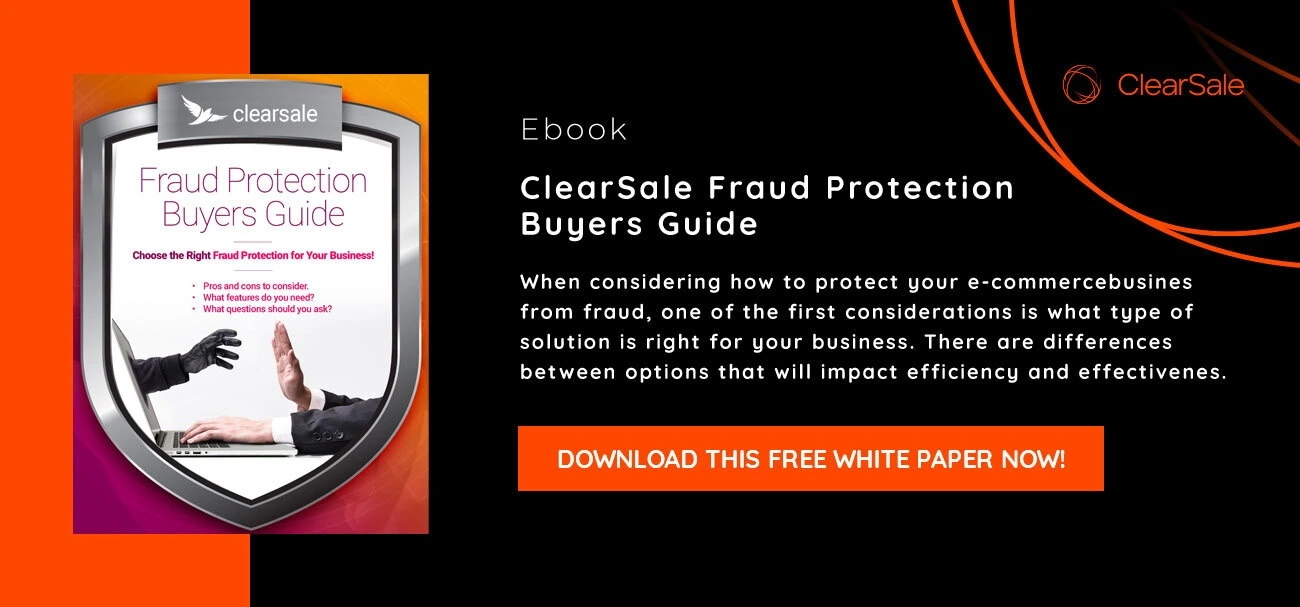Best Fraud Protection Solution: In-House, Outsourced, or Both?
For a growing e-commerce merchant, implementing and managing a fraud protection solution can seem like a cumbersome and expensive endeavor. It’s like buying life insurance: You think you don’t need it, until it’s too late. But with global payment card fraud losses incurred projected to top $35 billion by 2020, the sad truth is that card-not-present (CNP) fraud is a very real, very dangerous risk every e-commerce merchant faces.
Even a small fraud hit could still spell financial disaster for an unprotected business.
Although fraud protection is essential for e-commerce merchants, buying a solution is anything but straightforward. With so many options available — ranging from simple automated fraud filters to robust outsourced security solutions — the decision-making process can be difficult.
Different options have different advantages and disadvantages. Typically, though, choices fall into two main categories: developing an in-house fraud program, or outsourcing a fully managed services solution. So, what factors should merchants consider when making their decision?
Benefits of an In-House Security Solution
There are several good reasons for keeping a merchant security solution in-house, including:
- Process Control: Maintaining processes in-house allows control over which orders will be automatically approved, flagged for review, or automatically declined.
- Vendor Concerns: Merchants may not feel comfortable trusting an outside vendor to be so involved with sensitive customer relationships.
- Business Expertise: In-house teams may have an edge in understanding their business operations and having company-specific product knowledge.
How In-House Fraud Protection Can Hinder a Growing Business
While there are many valid reasons for a merchant to maintain control over fraud prevention, merchants must also consider:
- Increased Expenses: If online retailers don’t already have specialized staff in-house, they’ll incur costs to recruit, hire, train and retain personnel. Research suggests that fraud and chargeback management can account for 13% to 20% of a business’s operational budget — a bit hit to small businesses.
- Need for Agility: If sales volumes fluctuate, an in-house fraud management team may find themselves suddenly over- or under-staffed.
- Acquiring Tools and Technology: E-commerce business handling fraud management in-house must purchase and maintain the appropriate fraud protection technology, as well as integrate the technology with existing sales systems.
- Chargeback Fees and Penalties: Should fraudulent transactions make it past the in-house fraud management system, the business will be on the hook for all chargeback costs.
- Fraud Risk Expertise: An in-house team may be unable to keep pace with the evolving threats and fraud patterns that emerge.
Why Consider Outsourcing Your Fraud Management System?
Although it can be hard for a company to release control of something as important as fraud protection, there are numerous benefits to outsourcing this function, including:
- Comprehensive Insights: A dedicated fraud prevention provider has access to more diverse data points than an in-house team, enabling the provider to identify patterns and recognize fraud before transactions are processed.
- Frictionless Buying Experience: A trusted partner can quickly and seamlessly make decisions on transaction, meaning fewer transactions are flagged for manual review and more transactions get approved immediately.
- Fewer False Declines: Many outsourced solutions combine artificial intelligence and manual review to more accurately identify fraudulent behavior, which means fewer legitimate transactions will be incorrectly flagged as fraud.
- Predictable Costs: Because merchants will know how much they’re spending on fraud management relative to sales volume, which makes budgeting easier.
- Better Technology: An outside vendor will utilize innovative screening techniques and the latest fraud protection software, saving the merchant from having to make those investments directly.
- Less Drain on Resources: A trusted fraud protection partner lets e-commerce merchants refocus their time, attention and manpower back on critical business tasks, like product research and development and strategic management.
- Improved Compliance: Outsourced fraud protection solutions can guarantee compliance with complex Payment Card Industry Data Security Standard
- Support for Existing Teams: Outsourcing fraud protection doesn’t have to mean replacing an in-house staff. Some managed services solutions prefer to partner with the merchant’s fraud management team to gain the insider information the vendor may lack.
Making the Decision That’s Right for Your Business
E-commerce fraud increased an alarming 30% in 2016. So when it comes to protecting your online business, there’s no debate whether you need a fraud protection solution. But choosing the right solution isn’t easy.
Do your research, compare your options, and carefully evaluate which provider is right for you. Once you make your decision, you’ll breathe a sigh of relief, knowing you’ll be able to safely grow your sales, prevent fraud and chargebacks, and protect your profits.
If you’re not sure what questions to ask a fraud protection vendor, ClearSale can help. Download our free “Fraud Protection Buyers Guide“ today to understand your options and gain the confidence to choose the right fraud protection solution.
 Sarah Elizabeth
Sarah Elizabeth
